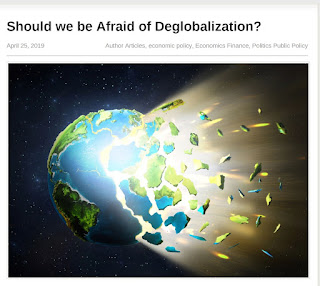The beginning of deglobalization or just a blip?
Bloomberg economist Carl J. Riccadonna said the current “trade war” was more a “trade skirmish” and that globalization was just slowing. Michael Pettis, professor of finance at Peking University’s Guanghua School of Management, in contrast, believes that we have entered a phase of deglobalization. Read more While I am quite persuaded by the data that deglobalization currently is a real world phenomenon with which we have to deal, others are clearly not. Lund and Tyson (2018) use a provocative title ‘Globalization Is Not in Retreat’ to point out that the slow-down of world trade in physical goods may be due to increasing e-commerce and digitalized services. By implication the traditional metrics of globalization show a decrease due to this substitution effect. Constantinescu et al. (2016) ask the question, ‘Does the global trade slowdown matter?’ Yet another disbeliever Bordo (2017) adds: ‘The Second Era of Globalization is Not Yet Over’ arguing that we are witnessing a slowdown of


